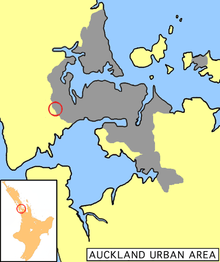Oratia
| Oratia | |
|---|---|
 | |
| Basic information | |
| Local authority | Auckland Council |
| Population | 2,511 (2006) |
| Surrounds | |
| North | Henderson Valley |
| Northeast | Sunnyvale |
| East | Glen Eden |
| South | Laingholm |
| Southwest | Titirangi |
| West | Waiatarua |
Oratia is a suburb of west Auckland in New Zealand, located in the former territorial authority of Waitakere City.
It is approximately 16 km to the south west of Auckland CBD (Central Business District), and sits at the eastern edge of the Waitakere Ranges Heritage Area.[1] It is a relatively quiet community, bridging metropolitan Auckland with the wild forests and beaches of western Auckland.
The population of the Otimai area (including Oratia and parts of neighbouring Waiatarua) was 2,511 in the 2006 Census [2]
History
Oratia was first settled in the 1860s, with 40-acre (160,000 m2) land parcels granted to new immigrants. Cochrane's orchard was possibly the earliest orchard in the area dating back to this time, although it no longer exists.
Sunnydale in Parker Road is the oldest surviving residence in West Auckland built around 1860 from Kauri timber milled on the site.[3]
Oratia Cemetery has burial sites dating from 1867 onwards. The gateway entrance was built in 1935. Its Category II listing is attributed to historical and visual significance.
Thomas Parr, a pioneer orchardist and nurseryman, established a plant nursery called Albion Vale on West Coast Road in 1879. Now a Category I Listed Building, the house has been restored to its original design after being used for many years as "The Town and Country Roadhouse", which was considered to be one of the finest restaurants in Auckland in the 1940s.[4] The small Oratia Folk Museum[5] is adjacent to Albion Vale. It was originally a small settler cottage built around 1870.
The Oratia Valley was settled by Dalmatian migrants in the late 1890s and early 1900s. They planted orchards and vineyards, leading to Oratia becoming known as the fruit bowl of Auckland. A strong sense of community developed which continues today, although some of the old families have moved out of the area. Many of Oratia's roads are named after the families who lived in Oratia in the 1800s, e.g. Parker, Carter, Shaw, Parr.
Many of the original orchards have now disappeared, and although still relatively sparsely populated compared to most of metropolitan Auckland, Oratia has developed into a community with many businesses and homes.
Community
Despite its small size, Oratia has a number of amenities:
- Landsendt[6] is a large sub-tropical garden considered to be of national significance.[7] A range of rare plants are grown here, many originally sourced from South America, and now forming a rare plant "gene bank".
- Oratia Native Plant Nursery[8] is renowned for plant conservation, and is one of the earliest native plant nurseries in New Zealand.
Notable People
Hugh Redgrove, a plant breeder from Oratia, introduced a Hebe named "Oratia Beauty" in 1982.[9]
Ann Endt,[10] an Oratia gardener, had a rose named after her.[11]
Gilian Painter is an Oratia writer who has had a number of books published about herbs and cookery.
Geoff Davidson of Oratia Native Plant Nursery received the Life Time Achievement Award from the New Zealand Plant Conservation Network in 2007 for his work to save species from extinction and being part of major initiatives to protect plants and plant communities.[12]
Education
Oratia District School,[13] established in 1882, provides primary (years 1-6) education for the area. It has a high decile rating of 9 and a roll of 542.[14] It serves Oratia and a catchment area extending to the coast at Piha and Karekare. There is also a kindergarten located on the same site.
The Bruce McLaren Intermediate school in Henderson, named after the New Zealand Racing Driver, provides education for year 7 and 8 students.
The local state secondary school is Henderson High School.
Liston College and St Dominic's College in Henderson both offer Catholic education.
References
- ↑ The Waitakere Ranges Heritage Area
- ↑ Quickstats about Otimai, and increase of 135 from 2001. The Otimai Census Area Unit includes Oratia, but also includes parts of Waiatarua.
- ↑ West: The History of Waitaikere. 2009. p. 441. ISBN 978-1-86979-008-0.
- ↑ West: The History of Waitaikere. 2009. p. 442. ISBN 978-1-86979-008-0.
- ↑ Oratia Folk Museum
- ↑ Landsendt
- ↑ New Zealand Gardens Trust
- ↑ Oratia Native Plant Nursery
- ↑ Hebe Society
- ↑ Ann Endt
- ↑ The Ann Endt Rose
- ↑ The New Zealand Plant Conservation Network
- ↑ Oratia District School
- ↑ Te Kete Ipurangi schools database: Oratia School
External links
- Photographs of Oratia held in Auckland Libraries' heritage collections.
Coordinates: 36°55′S 174°37′E / 36.917°S 174.617°E